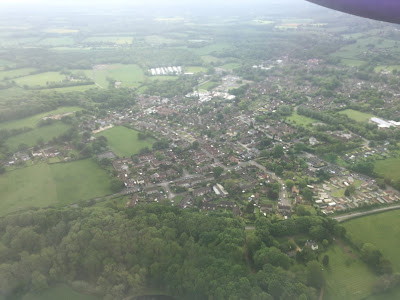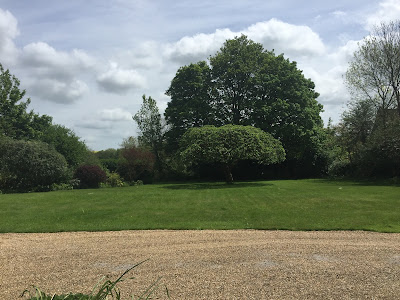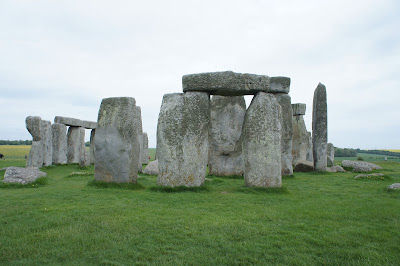Dublin ➝ Southampton: Stonehenge
What a day! We
rose early at 5AM to get ready for the bus at 6, boarded our flight at 8:30, and
then landed in England around 10AM. We then drove to Wiltshire, our home for
the next ten days. Then, after a nice lunch on the patio, we drove about five
miles to see Stonehenge. I can tell just by the short amount of time we’ve been
here that I am going to fall deeply and madly in love with England.
Though the day
started early, I think it was all very smooth. The bus came, dropped us at our
terminal, and we boarded the plane on time. We landed around 10AM and then had
an hour drive into Wiltshire from Southampton. The weather was partly cloudy,
though not rainy at all. Our lunch on the patio was amazing—plus, we got to eat
salad with fresh vegetables and avocado that wasn’t crunchy!
After the lovely
start to our day, we headed out around 2PM to go to our Stonehenge booking.
Apparently it gets very busy any time of the year, so we booked in advance and
got in free, thanks to our hosts’ membership and support to various town
associations. That was pretty neat, and very unreal. What it must be like to
live in the same neighborhood as Stonehenge…
The interpretive
center has apparently been recently redone, as the old one was horrible and
really did not explain anything about the monument or what the surrounding area
would have been used for. The new one is meant to look like a forest, so it has
an uneven roof and a very artistic construction. The interpretive center took
up about half of the building, and the gift shop the other half. Once we got
our tickets, we walked through the historical exhibit and learned a lot more
about the artifacts found at Stonehenge, when it was constructed versus other
major feats of design, and also what it might have looked like in its prime.
The most
astonishing thing I learned was that the bluestones (smaller stones used to
make the cross hatches on the tops of the columns) came from literally hundreds
of miles away in Wales. The larger stones only came from about 10 miles away,
but they still would have taken a team of 200 men up to 12 days to haul from
their point of origin to where they stand today. Also, archeologists
reconstructed the monument in the 20th century, meaning that how it
exists today might not have even been what it looked like before. We just
really do not know much about this megalithic site, which is probably why so
many people are fascinated by it.
Also important was the age of Stonehenge compared to other sites. The pyramids are thought to be quite old, but they were constructed around 2600BC. Stonehenge (2400BC) is one of the oldest Neolithic monuments, being only outdated by a few other sites—Newgrange (3000BC) being one of them. The complex itself also contains various other burial mounds and features, much like the Carrowmore cemetery we saw in Sligo. It was fascinating to see the map and just how spread out many of these monuments are. The fact that they are still standing is quite astonishing.
Once we had
learned a lot about the monument and its historical importance, we left to make
the two mile walk up to the stones themselves. We took the path through an
expensive field of buttercups, which took us right through the Stonehenge
cursus. This rectangular divot in the land is thought to be some sort of Roman
racetrack, which is where the term “cursus” comes from—“racecourse.” The walk
was beautiful, even if it was not sunny. The wind was nice but not too bad, and
it was not cold at all. The fields of Wiltshire seemed to open up around me,
and the sounds of nature brought me back home. I have never felt so at home
anywhere I’ve been. England has always had a special calling to me, and this
visit certainly proved it.
We originally
took the walk to see some of the burial mounds adjacent to the monument. After
making it there, we walked up on each one and saw some more of the countryside,
including other mounds in fields off to the distance. Then, after passing very
closely through a field of cows and calves, we arrived at Stonehenge.
Firstly, it is
much bigger than the stone circles we saw in Ireland. Though Newgrange would
have been the same size in diameter, these actual stones were absolutely
massive. I was unprepared for just how tall and thick they would be, but now I
suppose all the hype makes sense. It may not be the oldest or best example of a
Neolithic stone circle like Drombeg or any of the Irish ones, but it certainly
outsizes them. Pictures will only give relative scale—seeing it in real life really
put it into perspective, especially after seeing sights like the others.
We walked a full
circle around the monument and saw which stones looked more complete and which
ones looked out of place, according to the proposed diagrams. There are also
various other upright stones called Station stones and one called the Slaughter
stone—based on the incorrect belief that it was used to sacrifice. The station
stones would have been originally placed in a square surrounding the inner
circle. Now only two remain.
Once finished
with the circle, we walked back to the center and did a bit of looking around
the gift shop. They even accepted my Irish note, which I was quite happy about.
I was still in a little bit of shock about the important world heritage site I
had just seen, though. I cannot believe not only that we saw it on the
afternoon that we arrived, but that it is still so close to where we are
staying. It is less than five miles away. That is crazy. I am sleeping less
than five miles from Stonehenge!
Anyway, we had a
lovely dinner later that night and we stayed up talking and drinking tea for
quite some time before finally succumbing to tiredness. I think the early
morning finally caught up with the excitement. But the excitement did not end
there—we are only beginning our amazing journey. Tomorrow, we go to see Oxford,
and on Monday, we are planning to take the early train to Bath! What an amazing
time we will have. I absolutely cannot wait.
♥
photo credit Diana Cleveland














































No comments:
Post a Comment